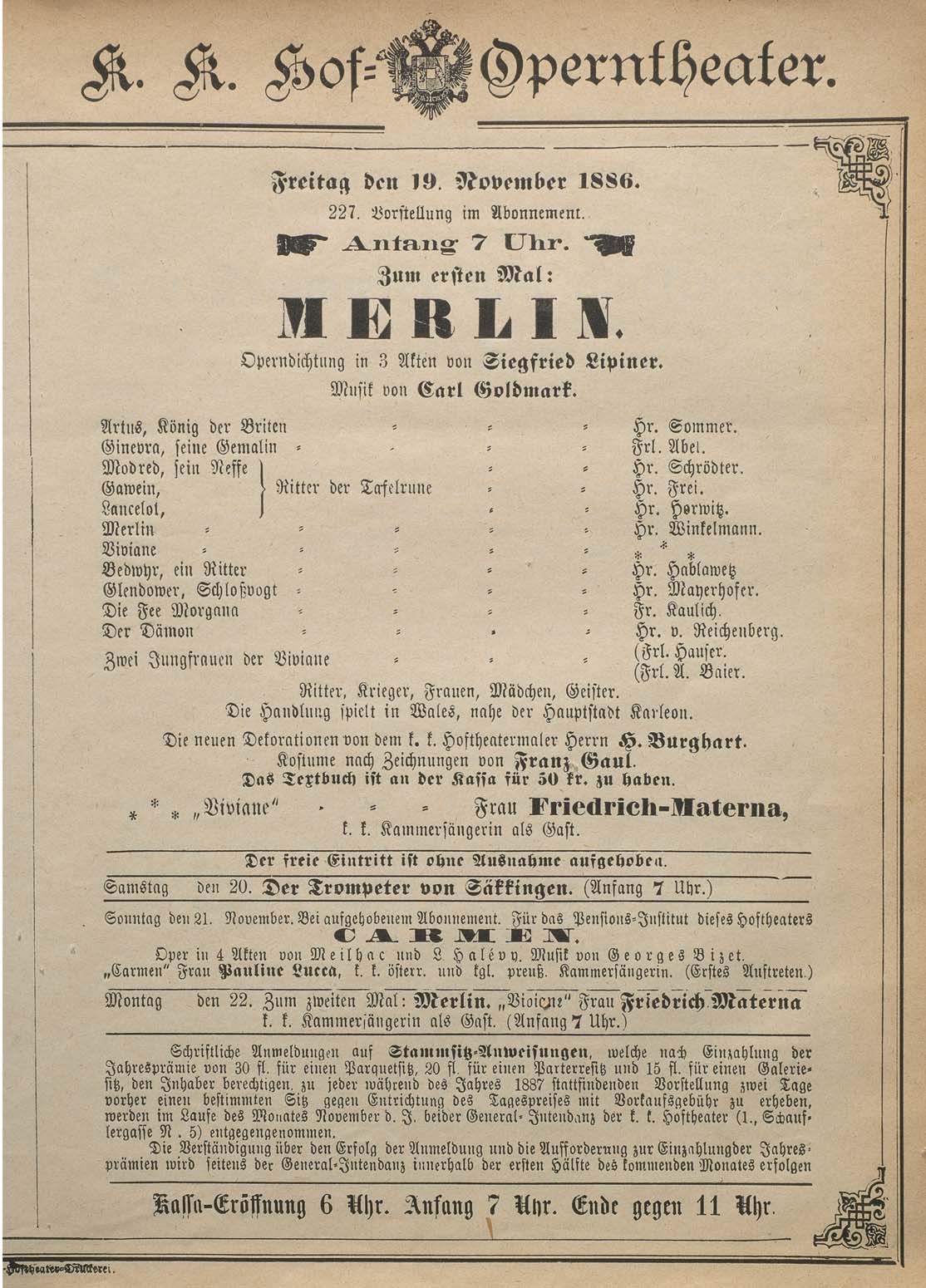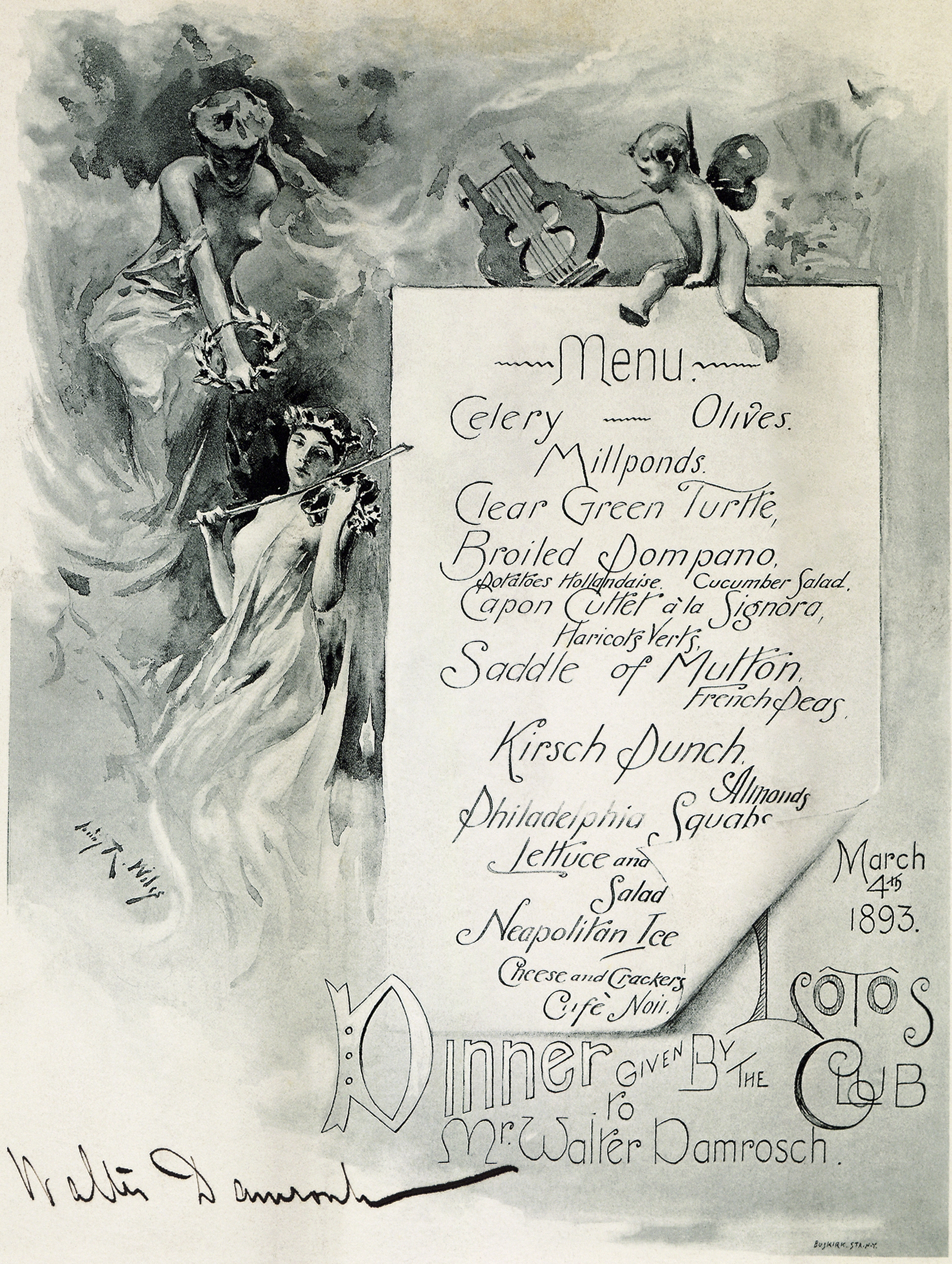|
Merlin (Goldmark)
''Merlin'' is a German-language opera by Karl Goldmark to a libretto by Siegfried Lipiner. It had its premiere at the Wiener Hofoper on November 19, 1886. The Metropolitan Opera gave the American premiere with Lilli Lehmann under Walter Damrosch Walter Johannes Damrosch (January 30, 1862December 22, 1950) was a German-born American conductor and composer. He was the director of the New York Symphony Orchestra and conducted the world premiere performances of various works, including Geo ... on January 3, 1887.David Ewen ''Musicians since nineteen hundred: performers in concert '' 1978 Page 186 - -"Damrosch was assigned the American premieres of Karl Goldmark's Merlin on January 3, 1887, and Cornelius's The ..." References External links * 1886 operas Operas by Karl Goldmark Operas German-language operas {{German-opera-stub ... [...More Info...] [...Related Items...] OR: [Wikipedia] [Google] [Baidu] |
Goldmark - Merlin - Programmzettel 1886
Goldmark can refer to: People *Henry C. Goldmark (1857–1941), American engineer who designed and installed the Panama Canal locks *Joseph Goldmark (1819–1881), Hungarian-American physician and chemist *Josephine Clara Goldmark (1877–1950), American social activist *Karl Goldmark (''Goldmark Károly'', 1830 –1915), Viennese composer *Kathi Kamen Goldmark (1948–2012), American author, columnist, publishing consultant, radio and music producer, songwriter and musician *Pauline Goldmark (1874–1962), American social reformer *Peter Carl Goldmark (1906–1977), Hungarian-American engineer and inventor * Peter Carl Goldmark, Jr. (born 1940), American publisher and journalist * Peter J. Goldmark (born 1946), American rancher, geneticist and politician *Rubin Goldmark (1872–1936), American composer, pianist, and educator Other *German gold mark, coinage of the German Empire, 1871–1918 *GOLDMARK, a mnemonic for causes of high anion gap metabolic acidosis High anion gap metabo ... [...More Info...] [...Related Items...] OR: [Wikipedia] [Google] [Baidu] |
Karl Goldmark
Karl Goldmark (born Károly Goldmark, Keszthely, 18 May 1830 – Vienna, 2 January 1915) was a Hungarian-born Viennese composer. Peter Revers, Michael Cherlin, Halina Filipowicz, Richard L. Rudolph The Great Tradition and Its Legacy 2004; , p. 227; "During the late nineteenth century, Karl Goldmark was among the most internationally celebrated of Viennese composers." Life and career Goldmark came from a large Jewish family. His father, Ruben Goldmark, was a chazan (cantor) to the Jewish congregation at Keszthely, Hungary, where Karl was born. Karl Goldmark's older brother Joseph became a physician and was later involved in the Revolution of 1848, and forced to emigrate to the United States. Karl Goldmark's early training as a violinist was at the musical academy of Sopron (1842–44). He continued his music studies there and two years later was sent by his father to Vienna, where he was able to study for some eighteen months with Leopold Jansa before his money ran out. ... [...More Info...] [...Related Items...] OR: [Wikipedia] [Google] [Baidu] |
Siegfried Lipiner
Siegfried Salomo Lipiner (24 October 1856 – 30 December 1911) was an Austrian writer and poet whose works made an impression on Richard Wagner and Friedrich Nietzsche, but who published nothing after 1880 and lived out his life as Librarian of Parliament in Vienna. A poet and dramatist of highly individual character, he is today remembered in German-speaking literary circles mainly for his translations of the Polish poet Adam Mickiewicz; he is also known to music history as having been a close friend of Gustav Mahler. Life Lipiner was born in Jarosław. A prodigious talent, he produced a well-regarded treatment of 'Prometheus Unbound' in 1876, He attended the University of Leipzig as a student of philosophy, literature and natural science; one of his teachers was Gustav Fechner. By his early twenties, he had produced an important work on the philosophy of Arthur Schopenhauer, and become a personal acquaintance of Nietzsche, who had called him 'a veritable genius'. They did co ... [...More Info...] [...Related Items...] OR: [Wikipedia] [Google] [Baidu] |
Wiener Hofoper
The Vienna State Opera (, ) is an opera house and opera company based in Vienna, Austria. The 1,709-seat Renaissance Revival venue was the first major building on the Vienna Ring Road. It was built from 1861 to 1869 following plans by August Sicard von Sicardsburg and Eduard van der Nüll, and designs by Josef Hlávka. The opera house was inaugurated as the "Vienna Court Opera" (''Wiener Hofoper'') in the presence of Emperor Franz Joseph I and Empress Elisabeth of Austria. It became known by its current name after the establishment of the First Austrian Republic in 1921. The Vienna State Opera is the successor of the old Vienna Court Opera (built in 1636 inside the Hofburg). The new site was chosen and the construction paid by Emperor Franz Joseph in 1861. The members of the Vienna Philharmonic are recruited from the Vienna State Opera's orchestra. The building is also the home of the Vienna State Ballet, and it hosts the annual Vienna Opera Ball during the carnival season. His ... [...More Info...] [...Related Items...] OR: [Wikipedia] [Google] [Baidu] |
The Metropolitan Opera
The Metropolitan Opera (commonly known as the Met) is an American opera company based in New York City, resident at the Metropolitan Opera House at Lincoln Center, currently situated on the Upper West Side of Manhattan. The company is operated by the non-profit Metropolitan Opera Association, with Peter Gelb as general manager. As of 2018, the company's current music director is Yannick Nézet-Séguin. The Met was founded in 1883 as an alternative to the previously established Academy of Music opera house, and debuted the same year in a new building on 39th and Broadway (now known as the "Old Met"). It moved to the new Lincoln Center location in 1966. The Metropolitan Opera is the largest classical music organization in North America. Until 2019, it presented about 27 different operas each year from late September through May. The operas are presented in a rotating repertory schedule, with up to seven performances of four different works staged each week. Performances are ... [...More Info...] [...Related Items...] OR: [Wikipedia] [Google] [Baidu] |
Lilli Lehmann
Lilli Lehmann, born Elisabeth Maria Lehmann, later Elisabeth Maria Lehmann-Kalisch (24 November 1848 – 17 May 1929) was a German operatic soprano. She was also a voice teacher. Biography The future opera star's father, Karl-August Lehmann, was a singer ( Heldentenor) while her mother, Maria Theresia Löw (1809–1885), was a soprano. Her younger sister, Marie, also went on to become an operatic soprano. Her first lessons were from her mother, who had been a prima donna under Spohr at the Cassel opera. After singing small parts on the stage, for example in Mozart's '' Magic Flute'' at Prague in 1866, and studies under Heinrich Laube in Leipzig, Lehmann made her proper debut in 1870 in Berlin as a light soprano in Meyerbeer's ''Das Feldlager in Schlesien''. She subsequently became so successful that she was appointed an Imperial Chamber Singer for life in 1876. Lehmann sang in the first Bayreuth Festival in 1876, singing in the first complete performances of The Ring Cy ... [...More Info...] [...Related Items...] OR: [Wikipedia] [Google] [Baidu] |
Walter Damrosch
Walter Johannes Damrosch (January 30, 1862December 22, 1950) was a German-born American conductor and composer. He was the director of the New York Symphony Orchestra and conducted the world premiere performances of various works, including George Gershwin's Piano Concerto in F, '' An American in Paris'', and Jean Sibelius' '' Tapiola''. Damrosch was also instrumental in the founding of Carnegie Hall. He also conducted the first performance of Rachmaninoff's Piano Concerto No. 3 with the composer himself as soloist. Life and career Damrosch was born in Breslau, Silesia, a son of Helene von Heimburg, a former opera singer, and the conductor Leopold Damrosch, and brother of conductor Frank Damrosch and music teacher Clara Mannes. His parents were Lutheran (his paternal grandfather was Jewish). He exhibited an interest in music at an early age and was instructed by his father in harmony and also studied under Wilhelm Albert Rischbieter and Felix Draeseke at the Dresden Conser ... [...More Info...] [...Related Items...] OR: [Wikipedia] [Google] [Baidu] |
1886 Operas
Events January–March * January 1 – Upper Burma is formally annexed to British Burma, following its conquest in the Third Anglo-Burmese War of November 1885. * January 5– 9 – Robert Louis Stevenson's novella ''Strange Case of Dr Jekyll and Mr Hyde'' is published in New York and London. * January 16 – A resolution is passed in the German Parliament to condemn the Prussian deportations, the politically motivated mass expulsion of ethnic Poles and Jews from Prussia, initiated by Otto von Bismarck. * January 18 – Modern field hockey is born with the formation of The Hockey Association in England. * January 29 – Karl Benz patents the first successful gasoline-driven automobile, the Benz Patent-Motorwagen (built in 1885). * February 6– 9 – Seattle riot of 1886: Anti-Chinese sentiments result in riots in Seattle, Washington. * February 8 – The West End Riots following a popular meeting in Trafalgar Square, London. * Februa ... [...More Info...] [...Related Items...] OR: [Wikipedia] [Google] [Baidu] |
Operas By Karl Goldmark
Opera is a form of theatre in which music is a fundamental component and dramatic roles are taken by singers. Such a "work" (the literal translation of the Italian word "opera") is typically a collaboration between a composer and a librettist and incorporates a number of the performing arts, such as acting, scenery, costume, and sometimes dance or ballet. The performance is typically given in an opera house, accompanied by an orchestra or smaller musical ensemble, which since the early 19th century has been led by a conductor. Although musical theatre is closely related to opera, the two are considered to be distinct from one another. Opera is a key part of the Western classical music tradition. Originally understood as an entirely sung piece, in contrast to a play with songs, opera has come to include numerous genres, including some that include spoken dialogue such as ''Singspiel'' and ''Opéra comique''. In traditional number opera, singers employ two styles of sing ... [...More Info...] [...Related Items...] OR: [Wikipedia] [Google] [Baidu] |





